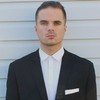Another day at the office for Ian Hodgkinson. Photo via Facebook.
Advertisement
WCW thought I was Mexican, and they were hiring anyone from Mexico that had a different look. You have to remember that the company was run by a bunch of guys from Atlanta. They were hillbilly types. When I showed up they didn't know what to do with me. I had just started listening to the Misfits new album, and I was like…fuck it. I'm going to phone these guys. I called the record label and got put on a conference call with [Misfits founder] Jerry Only. I had this idea that I would get played down to the ring with live music, this fast-paced punk rock song, and wanted to know if they were interested. Jerry loved the idea, and it just so happened that we were in town for Monday Nitro and they were in town for a concert. We met up, got along like old friends, and Doyle painted my face like a skull. We walked into the Nitro production meeting as a group, and The Misfits appeared on Nitro that night. The Misfits didn't last too long in WCW because of backstage politics with Randy Savage. How did you get involved with the Insane Clown Posse?
There was no backstage politics; Doyle stole the fucking guy's wife! I had read about ICP and I knew their loose affiliation with wrestling. I showed up backstage at Nitro one night and the company said I was going to be working with them. You can tell by the look in the eye and the feel of things whether you're going to be family with someone, and from the very first time I met the guys I knew. We were over huge with everyone, and those dudes are like brothers to me to this day. I was blessed to work with them, and we've done a ton of cool shit together. Since WCW folded you've had a lot of incredible experiences. You've appeared on a paranormal reality TV show, you've survived cancer, and you've fought against organized crime with independent justice agents The Guardian Angels. There is so much ground to cover in your life. What do you think about when you reflect on all these years?
There are a lot of things in my life to be grateful for, and I think it's just trying to make sure you stay positive and give back when you can. I've covered a lot of road and I have a lot more to go. It's not bad for a shy kid from Thunder Bay. This interview has been edited for length and clarity. _Follow _Graham Isador_ on Twitter._
